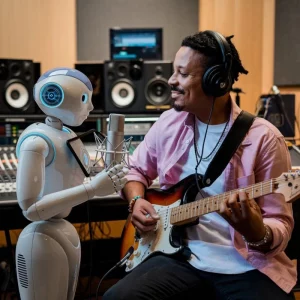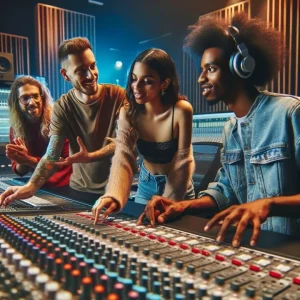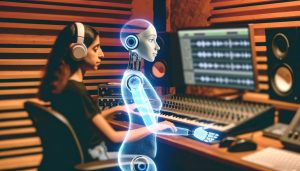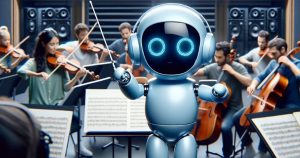Introduction to AI Music Production
Artificial Intelligence (AI) is making waves across many industries, and music production is no exception. AI is rapidly changing how music is created, composed, and even consumed. From streamlining workflows to creating entirely new compositions, AI is shaping the future of Rise of AI Music Production in ways that seemed unimaginable a decade ago. But what exactly is AI music production, and how is it impacting the industry?
The Rise of AI in Music Production

AI, or artificial intelligence, is quickly changing the world of music. It’s no longer just people who create songs; now, computers can help too. AI tools can help with many parts of music production, from writing lyrics to mixing sounds. As more musicians and producers start using AI, it’s becoming clear that technology is shaping the future of music in exciting ways.
What Is AI Music Production?

AI music production uses artificial intelligence and machine learning to assist in creating, editing, and producing music. Unlike traditional methods, AI systems can analyze vast amounts of musical data, recognize patterns, and produce compositions based on learned styles and trends. Tools like generative algorithms, neural networks, and deep learning enable these systems to create music that can closely replicate the style of human composers or develop unique and fresh compositions.
Benefits of AI in Music Production
AI offers many helpful tools for musicians and producers. It makes music production faster and often cheaper, which means that more people can make high-quality music. With AI, musicians can try out new sounds and styles they might not think of on their own. It also helps artists get their music to listeners who will enjoy it most by personalizing recommendations.
Mixing and Mastering Made Easy

Mixing and mastering are steps that make music sound polished and professional. Traditionally, these steps require a lot of technical skill and careful listening. With AI, producers can now get assistance with these complex tasks. AI programs can adjust volumes, remove background noise, and make the sound balanced and clear. This means artists without technical training can still produce music that sounds great.
Giving Small Artists a Big Opportunity

One of the exciting parts of AI music production is that it helps smaller, independent artists. Before, making high-quality music needed a big studio and a lot of money. Now, AI tools allow musicians to create professional-quality music at home. This means more artists can make music, even if they don’t have a big budget, leading to more diverse music in the industry.
AI’s Role in the Future of Music
AI is already a big part of the music world, and it will likely keep growing. Some artists might feel unsure about using it, while others see it as a helpful tool. The key is balance: using AI to support creativity, not replace it. As AI tools continue to improve, they will become even more useful, helping artists create, listeners discover, and the music industry evolve in exciting ways.
How AI is Revolutionizing the Music Industry

The use of AI in music production is revolutionary. Here’s how AI is changing different stages of music production:
1. Composition and Songwriting
AI algorithms can analyze existing songs, detect patterns, and create new melodies. Some software even allows musicians to input a few chords or lyrics, which the AI can use to generate additional elements for a song. This process saves time and gives musicians more options for exploring new ideas.
2. Editing and Mixing
AI tools can help engineers and producers with tasks like mixing and mastering, which often require fine-tuning. AI algorithms can enhance sound quality, adjust volume levels, balance instruments, and reduce background noise. These capabilities allow producers to create high-quality music more efficiently.
3. Enhancing Creativity
AI isn’t just about efficiency; it also opens up new creative possibilities. AI-powered tools allow artists to explore styles, sounds, and genres they might not have considered. By collaborating with AI, musicians can experiment with unfamiliar musical territories and gain fresh inspiration.
Advantages of AI in Music Production
AI offers many advantages in the music production landscape. Here are some of the key benefits:
- Increased Efficiency: AI tools streamline repetitive tasks, helping producers and artists focus on creative work.
- Cost Savings: By automating parts of the production process, AI reduces costs, making high-quality music production accessible to more artists.
- Personalization: AI can help personalize music recommendations for listeners based on their tastes, enhancing their experience.
- Access to New Tools: Artists can use AI tools to analyze trends, predict audience preferences, and produce unique compositions.
Limitations and Challenges of AI in Music Production
Despite its benefits, AI music production has its limitations. Some challenges include:
- Loss of Human Touch: While AI can replicate patterns, it may lack the depth and emotional connection of a human composer.
- Ethical and Copyright Concerns: Using AI to create music raises questions about originality and intellectual property, especially when AI mimics specific artists or genres.
- Dependence on Technology: Over-reliance on AI may discourage emerging artists from developing traditional musical skills.
AI-Powered Music Creation

AI is changing the way music is made. Instead of doing every step manually, musicians and producers now use AI software to help create songs. For example, some AI programs can suggest melodies, rhythms, or harmonies based on a few notes or ideas. This way, artists can try new sounds and styles quickly and easily, helping them stay inspired and experiment with different directions.
Saving Time and Effort
One of the biggest benefits of AI in music production is how much time it saves. Tasks like editing, mixing, and balancing sounds can take hours. AI tools, however, can make these adjustments automatically and within minutes. This gives musicians more time to focus on their art and less time on technical details. By speeding up these steps, artists can produce high-quality music much faster than before.
Creativity Meets Technology

AI doesn’t replace creativity; it works alongside it. Musicians can use AI to try out new sounds or add effects they wouldn’t normally consider. This technology can act like a creative partner, suggesting ideas that inspire musicians to step outside their comfort zones. Many artists feel that AI allows them to explore music in ways they couldn’t before, unlocking new creative paths.
Challenges and Concerns
However, AI in music production isn’t without issues. Some people worry that relying too much on AI could make music feel less human. AI might follow patterns and trends, but it may miss the personal touch and emotion that only a human can bring. There are also questions about who owns the rights to music created by AI, especially if it sounds very similar to other artists’ work.
The Future of AI in Music

As AI continues to improve, it will likely become even more common in music production. While it helps artists work faster and reach new heights, there will always be a place for human creativity and emotion in music. By blending technology with personal talent, the music industry is finding new ways to produce, share, and enjoy music. The future of AI in music looks bright, with endless possibilities for musicians and listeners alike.
Analysis Table of AI in Music Production
| Aspect | Impact of AI on Music Production | Description |
|---|---|---|
| Efficiency | High | AI speeds up tasks like mixing, mastering, and songwriting. |
| Cost | Moderate to Low | AI tools reduce costs but may require initial investment in software. |
| Creativity Enhancement | High | AI encourages artists to explore new sounds and genres. |
| Audience Engagement | High | AI helps to personalize music based on listener preferences. |
| Dependency Risk | Moderate | Over-reliance on AI could limit traditional music skills. |
| Intellectual Property | Complex | Raises concerns over copyright and originality of AI-generated content. |
Comparative Table: Traditional vs. AI Music Production
| Aspect | Traditional Music Production | AI Music Production |
|---|---|---|
| Composition Process | Requires human creativity | Automated; AI can generate melodies and harmonies. |
| Time Efficiency | Generally longer | Faster, with AI assisting in repetitive tasks. |
| Cost | Potentially higher | Lower costs with AI handling parts of the workflow. |
| Emotional Depth | Strong, human-based emotion | May lack emotional depth in some AI compositions. |
| Access to Tools | Limited to traditional methods | Expands creative tools through AI-based programs. |
| Audience Insights | Based on market research | Personalized via AI algorithms and data analysis. |
Conclusion
AI in music production has brought unprecedented innovation, transforming how music is created, produced, and enjoyed. While AI’s efficiency and creativity-enhancing capabilities are advantageous, concerns remain about the lack of human touch and intellectual property rights. As AI technology continues to evolve, the future of music production may see a harmonious blend of human creativity and AI’s powerful potential.




